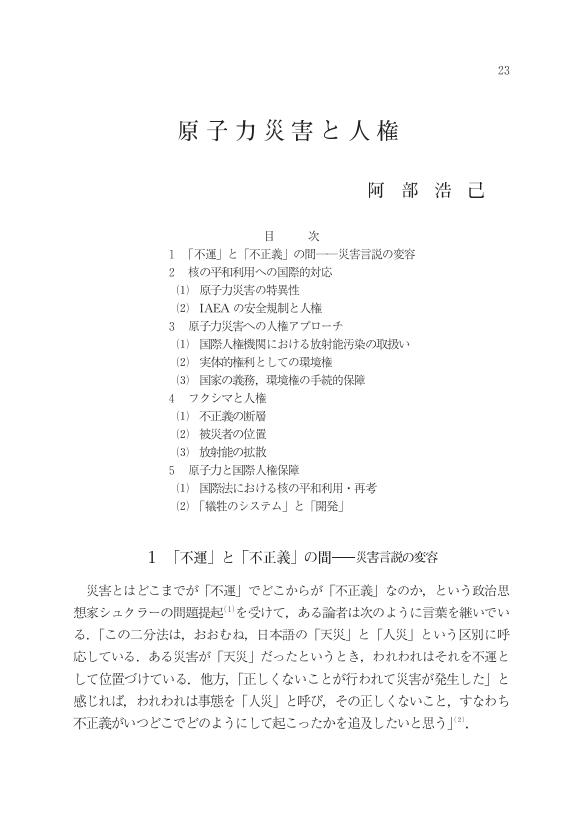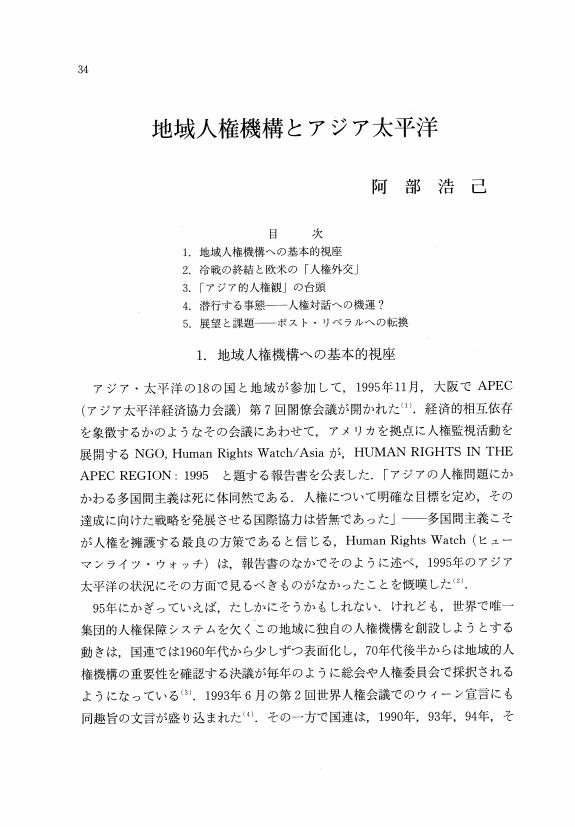42 0 0 0 OA グローバル化する国境管理
- 著者
- 阿部 浩己
- 出版者
- 世界法学会
- 雑誌
- 世界法年報 (ISSN:09170421)
- 巻号頁・発行日
- vol.37, pp.38-62, 2018-03-28 (Released:2021-04-16)
3 0 0 0 OA 2‒3 無国籍者の情景 : 国際法の視座,日本の課題
- 著者
- 阿部 浩己 阿部 浩己
- 出版者
- 国立民族学博物館
- 雑誌
- 国立民族学博物館調査報告 (ISSN:13406787)
- 巻号頁・発行日
- vol.118, pp.79-85, 2014-03-31
3 0 0 0 OA 国家責任のポリティクス
- 著者
- 阿部 浩己
- 出版者
- The Japanese Association of Sociology of Law
- 雑誌
- 法社会学 (ISSN:04376161)
- 巻号頁・発行日
- vol.2002, no.56, pp.66-83,275, 2002-03-30 (Released:2009-01-15)
- 参考文献数
- 51
Breaking five decades of silence, Asian women courageously emerged in the public arena as survivors of Japanese military sexual slavery. The immediate response of the Japanese ruling elite was a blatant disregard of their voices and yet another imposition of silence. Under the circumstances, one fundamental challenge facing international legal scholarship is to make an inquiry into the legal implication of silence consistently forced on victimized survivors. It necessarily ignites a process of re-examining the value premises which dictate the purposes and beneficiaries of the international law.Behind the forced silence is classical liberalism, the dominant theory of international legal studies. Justifying legal regulation based on the ideas of consent, liberty and equality of states, classical liberalism continuously reproduces the preeminent concept of elitism in international society. The fulcrum of this theory may be broken down into four "isms": euro-centrism, andro-centrism, statism and presentism. Under the pretense of objectivism and stability of legal order, classical liberalism strenuously backs up the ruling elites' inhumane response of suppressing survivors' desperate calls.Vibrant streams increasingly visible in international legal scene in the 1990', represented inter alia by the Australian-led feminist school, effectively debunks the value premises of mainstream international legal studies, thus leading a world-wide movement to "open up" otherwise closed international law. Deliberately un-silencing voices of the "Others", i.e. non-Europeans, women, citizens and the past (and the future) generations, the new movement has brought forth a welcoming progress in international law in such areas as human rights and humanitarian law. Commonly observed in a number of litigations filed by survivors of Japanese military sexual slavery against the culpable government is a call for the deconstruction of international law so that the voices of the Others are secured therein. Clearly, their call synchronizes the world-wide legal movement to reshape international law.This essay is intended to portray the value premises and legal implications behind international law arguments presented in connection with the issue of Japanese military sexual slavery. Reference is made as well to a Peoples' Tribunal, the Women's International War Crimes Tribunal 2000 in Tokyo, which in the view of the author, is a manifestation of the dynamic process to open up international law to citizens and women, whose agonies have been unheeded in the state-centered, patriarchal international legal scene.
2 0 0 0 OA 「憲法の国際化」と「国際法の憲法化」の交錯下での新たな人権保障システム理論の構築
- 著者
- 江島 晶子 戸波 江二 建石 真公子 北村 泰三 小畑 郁 本 秀紀 薬師寺 公夫 阿部 浩己 村上 正直 齊藤 正彰 鈴木 秀美 大藤 紀子 戸田 五郎 門田 孝 申 惠ボン 山元 一 中井 伊都子 馬場 里美 西方 聡哉 須網 隆夫 愛敬 浩二 徳川 信治 前田 直子 河合 正雄 菅原 真 辻村 みよ子 根岸 陽太 村上 玲
- 出版者
- 明治大学
- 雑誌
- 基盤研究(A)
- 巻号頁・発行日
- 2015-04-01
本研究は、グローバル化する世界における法のありようとして、「憲法の国際化」と「国際法の憲法化」という現象における両者の接合面に注目し、人権実施における問題点を明らかにしながら、より実効的な人権保障システムに関する理論構築を目指した。その結果、「憲法の国際化」と「国際法の憲法化」の接合面において比較憲法と国際人権法の積極的接合関係を観察することができ、人権保障の実効性を高める新たな人権保障システムを構築することは可能であり、そこでのキー概念は多元性、循環性、非階層性であることが析出できた。
1 0 0 0 OA 原子力災害と人権
- 著者
- 阿部 浩己
- 出版者
- 世界法学会
- 雑誌
- 世界法年報 (ISSN:09170421)
- 巻号頁・発行日
- vol.32, pp.23-61, 2013-03-28 (Released:2017-11-22)
1 0 0 0 OA 地域人権機構とアジア太平洋
- 著者
- 阿部 浩己
- 出版者
- 世界法学会
- 雑誌
- 世界法年報 (ISSN:09170421)
- 巻号頁・発行日
- vol.1997, no.16, pp.34-56, 1997-03-20 (Released:2011-02-07)
- 参考文献数
- 28
1 0 0 0 OA 三つの認識ギャップ
- 著者
- 阿部 浩己
- 出版者
- 公益財団法人 日本学術協力財団
- 雑誌
- 学術の動向 (ISSN:13423363)
- 巻号頁・発行日
- vol.15, no.9, pp.9_42-9_48, 2010-09-01 (Released:2010-11-16)
1 0 0 0 OA 2‒3 無国籍者の情景 : 国際法の視座,日本の課題
- 著者
- 阿部 浩己 Abe Kohki
- 出版者
- 国立民族学博物館
- 雑誌
- 国立民族学博物館調査報告 (ISSN:13406787)
- 巻号頁・発行日
- vol.118, pp.79-85, 2014-03-31 (Released:2015-11-18)



